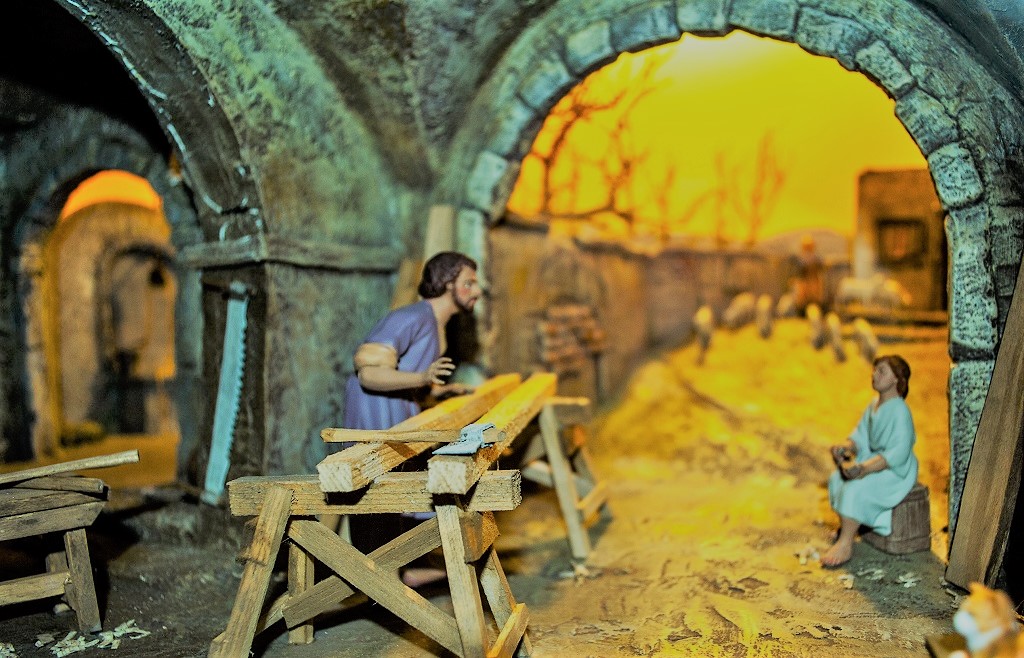On the sixth day of Christmas my true love gave to me, six geese a’laying
The number six is meant to represent the six days of Creation.
Today, we turn our prayerful attention to the Holy Family. It would be easy to dismiss the Holy Family as some sort of fairty-tale creation, a house where no one ever gets angry or raises a voice, where chores are always cheerfully done and there is no such thing as illness or suffering.
That would be wrong.
True, the Holy Family consisted of the Second Person of the Holy Trinity, a woman who never sinned and a husband and father who we know to be good and just. But this family knew tremendous hardship. Their son was born in a stable – not exactly what first-time parents would consider a great birth experience. They had to leave all they had behind as they made their way to Egypt in order to keep their Son safe. Imagine, if you will, having to leave NOW with your family and only the clothes on your back for safety. You end up in a foreign land, new parents with no support system. You have no idea how long you’ll have to stay. At some point, the Holy Family lost the man who anchored them in place, regardless of where they were; Joseph died. He was not there to support his foster Son and his wife during the most gut-wrenching time in their lives.
The Holy Family had to make a living, prepare food, clean, get water. They got sick. They prayed together. Deacon Michael Bickerstaff:
The Holy Family is a family that knew hardship yet remained steadfast in God. It is for our families to imitate their model if we are to know joy and peace in the midst of this life; if we are to attain holiness and salvation for ourselves and for our children…
For thirty of His thirty-three years, Jesus lived a humble and obedient life within His family before embarking on His public ministry. In this way, He allowed Himself to be taught experientially by His mother and foster-father, in their words and deeds, in acts both extraordinary and ordinary.
They taught Him the traditional prayers and piety, passed on the cherished customs of His people, showed him the greatest example of love and affection within the family, gave to Him a skill and trade to help support the family.
In His public ministry, Jesus taught with words and examples taken from his early and hidden family life. In the lessons He taught, we discover the great love and courage that St. Joseph must have exhibited for Jesus and His Blessed Mother; the tender love and care that must have been shared between mother and son.
Do not think of the Holy Family as the Never Had Any Problems Family. That family doesn’t exist. The Holy Family, in “acts both extraordinary and ordinary,” are tremendous examples of how a family should be: loving, supportive, prayerful. All families should strive for this holy life. Holy Mary, prayer for us. Good St. Joseph, pray for us. Jesus, Son of God and Son of Man, have mercy on us.
[From the United States Conference of Catholic Bishops: “The liturgical season of Christmas begins with the vigil Masses on Christmas Eve and concludes on the Feast of the Baptism of the Lord. During this season, we celebrate the birth of Christ into our world and into our hearts, and reflect on the gift of salvation that is born with him…including the fact that he was born to die for us.” There are, however, the traditional “12 Days of Christmas,” captured in the song of the same title. Some claim the song was meant as catechism of a sort, written and sung for nearly 300 years of British persecution of Catholics. We will be using both the song and the Church’s liturgical calendar to celebrate the Christmas season. We hope you enjoy.]


